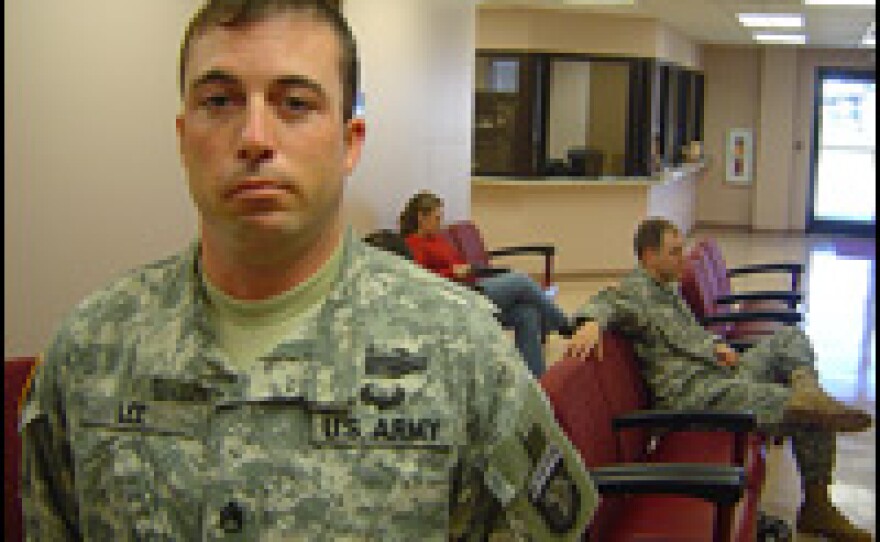
One out of every five U.S. soldiers reports coming back from Iraq and Afghanistan with mild traumatic brain injury, also known as TBI. Roadside bombs and Humvee wrecks are often to blame.
TBI symptoms can be hard to identify, but Army doctors are finding more cases because of baseline testing that began two years ago. Early detection is helping more soldiers heal instead of suffering in silence.
Tricky Symptoms
Sgt. Albert Couture's road to recovery begins behind a horse stable on the Tennessee side of Fort Campbell, which also straddles Kentucky. He leads a mare named Jazz to a green pasture. Horseback riding should help Couture regain some of the balance he lost after run-ins with improvised explosives in Iraq on his last deployment.
"We weren't always that far away," Couture said. "Then there were a couple of times where we got hit by IEDs [improvised explosive devices]."
Couture did not leave Iraq with visible injuries, but small concussions can catch up with a soldier, even years later. Army physical therapy technician Dennis Russell says unit leaders don't always pick up on the symptoms, or they confuse them with post-traumatic stress.
"You can do most of your daily job, but some things make you very anxious, make you dizzy, make you nauseous," Russell said.
'I Just Figured I Had A Bad Head'
For Couture, TBI showed up in the form of headaches and dizziness.
"I didn't think anything was wrong with me," he said. "I figured I just had a bad head."
But dizziness slowly became emotional instability after returning home in November. Couture said he became an angry person — or, at least, he was told he had become angry.
"I don't really remember," Couture said, explaining that he eventually put his fist through a glass door.
Fortunately, he was one of the first soldiers to take the baseline testing, which originated at Fort Campbell's TBI clinic two years ago. That allowed Dr. David Twillie, the clinic's director, to turn back time on Couture's brain.
"The question you have when you see someone with mild traumatic brain injury is, 'So, what were they like before?' " Twillie said.
The 10-minute neurological assessments have now spread Army-wide. They are administered on a computer before and after deployment. The questions flex a soldier's short-term memory, emotional state and computation skills with such questions as: "What is 3 minus 1 plus 4?"
A 12-Week Therapy Program
Army doctors tell soldiers that most mild TBI cases get better on their own. But at Fort Campbell, 550 soldiers recently back from deployments have been flagged for a 12-week therapy regimen.
In a tiled exam room, Twillie stares at a computer monitor charting the chaotic brain activity of Sgt. Michael Hensley as he tells the young father to grit his teeth. Hensley survived a rollover crash in Iraq and an IED attack that killed others.
Wearing what looks like a water polo cap with a rainbow of wires connected to it, Hensley takes part in a relaxation exercise, attempting to keep the monitors flat by closing his eyes and clearing his mind.
"I was struggling for a while. ... I was irritated, forgetful. I wasn't able to multitask," Hensley said. "Things I was normally able to do, I couldn't do anymore."
Hensley has a good shot at recovering. He found another assignment within the Army that keeps him off the front lines.
Ready For Combat?
More than three-quarters of patients leave Fort Campbell's TBI clinic symptom-free. Many of those without additional injuries return to their combat jobs. But before being cleared for duty, they must take a turn in a convoy simulator.
A seasoned soldier coolly calls out "enemy, rooftop," as he fires at insurgent fighters on a wall of video screens. They show the streets of Baghdad in stunning detail.
Six months ago, after a Humvee rollover in Iraq, Staff Sgt. Clifford Lee forgot that he was married and that he had kids. Now he has been cleared to return to duty.
"I really do want to deploy again," Lee said. "I feel that as long as I can think for myself and I can walk and I can talk, that there's no reason I shouldn't be able to help my brothers and sisters."
While doctors have gotten better at identifying and treating TBI, they still have trouble figuring out exactly when a soldier is ready to go back to war. But they are working on it, because a combat-tested soldier has become all the more valuable to a force stretched thin across two wars.
Blake Farmer reports for member station WPLN.
Copyright 2022 NPR. To see more, visit https://www.npr.org. 9(MDAzMjM2NDYzMDEyMzc1Njk5NjAxNzY3OQ001))






